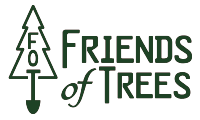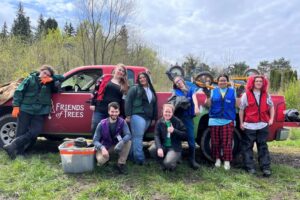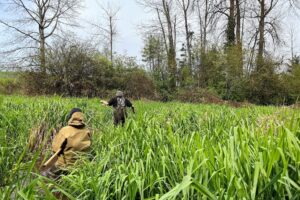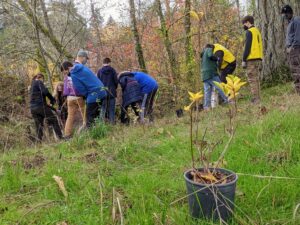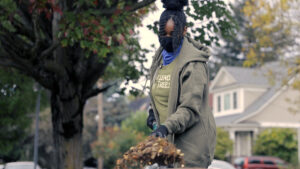Tag: youth education
Opening Doors With Youth Engagement
Our youth programming creates opportunities for young people to engage with nature
Getting youth excited about trees and green spaces is one of the best parts about our work. Friends of Trees engaged over 250 young people through youth programming this season!
“I had kids coming up to me and saying, ‘this is your job?!’” Green Space Specialist Kaitie Benedek says of her time working with students from CF Tigard Elementary School and Fowler Middle School. On five different planting days, 5th, 6th, and 7th grade classes planted native plants at Woodard Park and Dirksen Nature Park, which is adjacent to the middle school’s campus.
“We’d have classes of 25 at a time planting for one class period, so it was super fast,” Kaitie says. “So many kids got excited about planting, and about getting to contribute to this park right by their school. A lot of the kids even named their plants.”
Students from Cascade Education Corps (CEC) helped lead the plantings. CEC members are high school students following an alternative path to graduation by working on hands-on environmental projects. They spend three days per week out in the field working on restoration projects sponsored by other Tree for All partners, including Clean Water Services and Friends of Trees. With elementary, middle and high schoolers working together and people walking by in the park offering encouragement, the plantings at Dirksen and Woodard had a wonderful intergenerational feel to them.
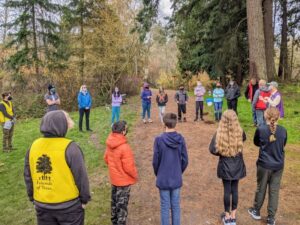
That spirit of connection and mentorship was present at Oregon Trail Elementary too, where forestry students from the Sabin-Schellenberg Center helped facilitate a full day of hands-on environmental education.
“Teachers and parent chaperones were very happy to get the kids outside,” says Green Space Specialist Meng Vue. “These kids weren’t afraid to get dirty.”
Students rotated through five different stations, learning to plant and mulch, decorating wood cookies, and learning about the local ecology with skulls, pelts, and pine cones. The goal was to show students all aspects of a healthy watershed and how planting native plants is an important component of that.
“When you get students involved in learning about the environment, appreciating the place and engaging with it, they’ll take those lessons home and share them,” Meng says.
Harrison Layer, another Green Space Specialist, echoes the importance of opening those doors through education. “When I was young, I saw nature as a big green blob. What are the ways to start to get curious?”
Harrison works closely with students from Portland Opportunities Industrialization Center (POIC), a nonprofit that connects high school youth with career training, including partnering with Friends of Trees. POIC students train as crew leaders and lead Friends of Trees plantings throughout the season.
“We had several students from last year come back this year,” Harrison says, “and it was great to see them grow into a leadership role. The mix of veteran and new students worked really well.”
Working with the POIC crew for an entire season means that you can see amazing growth in skills and confidence. “Everyone grew in their public speaking ability,” Harrison says. “By the end of the season, we had some students who demonstrated the confidence to represent their program through elevator pitches to large groups of volunteers at the beginning of our events.”
In addition to helping at plantings, POIC students got to go on several field trips, including mountain biking at Gateway Green, studying ecosystems at Whitaker Ponds Nature Park, and getting to know turtles and amphibians at Oaks Bottom Wildlife Refuge.
“One of the students at Oaks Bottom referred to this program as ‘unlocking’ new places for them to know and appreciate, much like a video game,” Harrison says. “I loved that!”
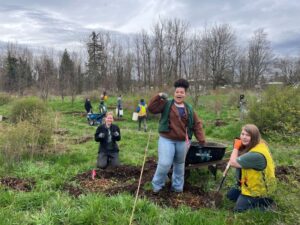
Exchanging Knowledge at Chemawa
An education program for Native American students
One day this spring, Harrison found himself waist deep in water in the wetlands on the campus of the Chemawa Indian School, a Native American boarding school in Salem. Harrison, a Green Space Specialist with Friends of Trees, was there with six Chemawa students who enrolled in a class on outdoor education and habitat enhancement.
“Getting outside, away from the classroom, I got to see the students have a moment of immersion and creative discovery,” Harrison says. “They weren’t just looking for critters, they were also thinking about what that means for the environment.”
Friends of Trees has been partnering with the Chemawa Indian School for over seven years on a program designed to provide opportunities for students to build knowledge and skills that could lead to careers in the environmental field.
This year, the program had six students between 16 and 18 years old. The program includes a combination of classroom and field study. In the past, students trained as Friends of Trees Crew Leaders and participated in events, but the pandemic has made that difficult in recent years.
“The pandemic has limited field trips, so it’s been more of a stationary program on campus,” says Meng, another Green Space Specialist who works with the Chemawa students. “We’ve had to adapt and be creative, but we still have the aim to spark interest in green work.”
Luckily, there is a wetland right on campus, where students were able to test the health of a stream, plant trees and native plants to improve that health, and learn to identify plants and wildlife. They also learned how to safely use tools to improve habitat, remove invasive species, and maintain trails.
Friends of Trees provides this programming alongside Elderberry Wisdom Farm, an organization that provides opportunities for Indigenous youth to strengthen their traditional ties with the land and to build career pathways. The Chemawa program incorporates storytelling and traditional ecological knowledge (TEK), which often takes a longer view and more holistic approach to habitat restoration.
“I’ve really appreciated having the opportunity to learn about TEK from Elderberry Wisdom.” Harrison says. “We want to use our resources to empower Native organizations like them.”
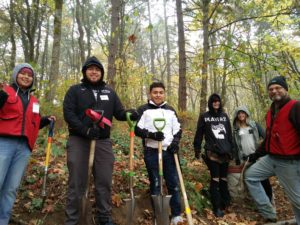
The goal is to merge TEK with other career building skills, so that the students can see a possible path in the green workforce after they leave Chemawa, and have a sustained interest in issues like tree canopy, water resources, and climate change. Meng and Harrison got to see some of that spark, especially when they took the students out of the classroom and into the field.
“When I got to plant with the students, I could see that they were genuinely excited to plant,” Meng says. “They got to plan where the plants could go, and have ownership over the process.”
The program has an opportunity to grow, especially with a deepened relationship with Elderberry Wisdom Farm. In the future, we hope to once again provide crew leader training to the students and have them lead volunteers at planting events. On campus, there’s room to enhance the wetland by planting a more diverse palette of native plants and adding trails so that students can go there and feel a connection to nature, maybe without having to get waist deep in water.
Youth Plantings Are Back!
Cascade Education Corps leads plantings with Fowler Middle School students
You can always hear eighth graders coming. On a clear day at Fowler Middle School in Tigard, Cascade Education Corps members eagerly awaited leading their first planting of the season. The shovels stood in a neat circle, the trees were placed where they needed to be planted, and with an excitement you could hear before you saw it, the students from Ms. Scheller’s science class arrived to do the work.
Friends of Trees has been working with kindergarten-through-eighth graders for over twenty years. This programming has taken different forms, starting with the “School Trees Program” in the late nineties. Since 2009, much of our youth engagement has been with our Green Space program. It was put on pause because of the pandemic, but with this planting at Fowler Middle, K-8 plantings are officially back!
The CEC are all high school students following an alternative path to graduation by working on hands-on environmental projects, gaining skills and knowledge that can lead to career opportunities. There were five CEC members here today with their crew leader, Michelle. By this point in the season, they were already planting experts ready to share their knowledge with the Fowler students.
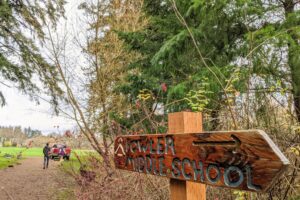
“This can be a really meaningful experience for these students,” Michelle said to the crew before the eighth graders arrive. Kaled, one of the CEC members, knew this firsthand. He was a Fowler Middle School student himself and fondly remembers when he planted trees with the CEC.
The planting was at Dirksen Nature Park, conveniently adjacent to Fowler’s campus. After the students arrived, everyone introduced themselves, and talked about why planting native trees is important. Thinking big picture, one student immediately shouted, “climate change!” Thinking locally, Meng Vue, a Friends of Trees Green Space Specialist, talked with the students about how these plants would slow erosion and stabilize the stream that runs between the park and their school.
Then the kids split into groups, each led by a CEC member. They learned how deep to dig their holes, how to get the tree out of its pot, and how to replace the soil just right. With the pandemic causing so much need for virtual learning, the kids planted trees with eagerness and enthusiasm, grateful for a hands-on activity. In just 45 minutes, every student planted a tree.
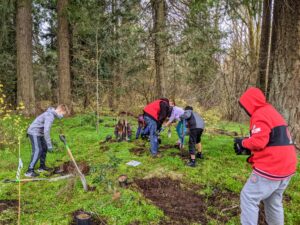
“After all they’ve had to adapt to, It’s so great to get them outside like this,” Ms. Scheller said.
Three different classes participated throughout the day. Meng was beyond pleased with how well the CEC members worked with the students. “Teachers enjoy having the CEC teach the students,” Meng said. “It’s really bridging the gap between high school and middle school.”
This was just the first of six plantings scheduled this year at Fowler Middle School. Come spring, we’ll have plantings at Oregon Trail Elementary School in Clackamas County, with first-year forestry students from the Sabin Schellenberg Center serving as crew leaders. Youth engagement is critical to our mission—it creates the next generation of tree stewards in our community. On top of that, it’s just plain fun to see these kids get their hands dirty.
Special thanks to our partner Clean Water Services for supporting this work!
Get to know Adrián + Project Zero
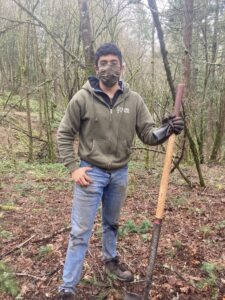
Through Project Zero young people are creating cleaner, greener communities
Project Zero intern Adrián Moreno just completed his internship with Friends of Trees and to celebrate the milestone he recently guest-starred on our Instagram account to share a little bit about his experience:
“I wanted to help mitigate the environmental crisis that we are all living right now, so I applied to the PGE Project Zero intern position and got the job! Through this internship I got to be involved in the process of creating, maintaining, and restoring green spaces.
“I also got to build and maintain community with people who want to help the environment. I was able to learn new skills and experience new environments. Before this day, I was afraid of public speaking.”
Taaj Armstrong, PGE Dean of Cohort, talks a bit about Project Zero, “Environmental stewardship is one of PGE Project Zero’s core components; with equity as a large driver, we knew that a strategic partnership with Friends of Trees would be integral in reducing the negative health impacts of climate change on low-income communities, Indigenous populations and communities of color. We were also thrilled that Friends of Trees is a partner in PGE Project Zero Works, helping to design the green jobs internship program, and hosting a PGE Project Zero intern, which has been wildly successful.”
We loved working with Adrián and are excited to share that he’s still on the Tree Team through another of our educational programs, “I really appreciate the opportunity that FOT has given me and I’ll continue working with them through the Adult Urban Forestry Training Program and complete my career in environmental economics!”
Photo: Adrián in action during his Project Zero internship.
Connecting Black urban youth to the environment
Meet The Blueprint Foundation
“I like the feeling of getting my hands dirty because I feel like I did something. It’s a good feeling.”
Lashay, Friends of Trees intern through the Blueprint Foundation
Friends of Trees is fortunate to have relationships with quite a few local nonprofit organizations that benefit under-served communities, such as communities of color, at-risk youth, and neighborhoods with very little tree canopy. These partnerships help make trees accessible to community members who may not otherwise have access to all that trees do for us.
The Blueprint Foundation works to expose Black urban youth to learning opportunities they usually do not get to access. Friends of Trees is proud to be a partner to the Blueprint Foundation’s Grounding Waters program, where students learn about careers in environmental science while taking an active role in environmental stewardship.
“One of the first and most consistent activities we’ve had our kids do is the Friends of Trees neighborhood plantings, which allows them to connect with their neighbors, as well as do something directly beneficial to their own community, that they see, that has permanence.” – Jason Stroman, Program Director, The Blueprint Foundation; Friends of Trees Board of Directors
The Friends of Trees – Blueprint Foundation partnership introduces Black youth to jobs in the urban forestry field. Students receive stipends to gain job and leadership skills through training and participating with Friends of Trees as Summer Tree Inspectors and tree planting Crew Leaders.
The Blueprint-Friends of Trees partnership helps connect young people to the environment, while also supporting a historically underrepresented community’s access to nature and its benefits by decreasing barriers to participation. “The ultimate goal,” Jason points out, “is to eliminate the opportunity gap that we see for Black youth.”
